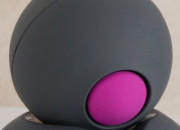Yesterday, Google introduced Helpouts, an extension of their video chat service Hangouts that enables you to have video conversations with other people across the world, share screens and record sessions — with a number of experts in various categories. While a sexual health category doesn’t yet exist, the health category could comfortably accommodate such endeavors. Google warns “Helpouts may not be suitable for every occasion,” but as far as I can tell, the Terms of Service don’t disallow it.
Technology
The story about Kenji, the robot programmed to love that turns into a stalker will continue to make the rounds no matter how many people reveal the hoax. This tale is reassuring. The fact that Kenji so terrifyingly goes over the line pacifies us — no, it reminds us. Robots are not like us. But robots are all around us. And they’re getting better and better at passing for human. This is the story of two men. And the bots they might have loved.
Disrupt came under fire after programmers showcased Titstare, an app for people to post pix of themselves ogling women’s breasts. The presentation praised the app as a way for men to stay healthy, citing junk science about how looking at breasts increases a man’s life and hypothesizing that a recent decrease in male life expectancy was the result of the widespread adoption of Cleava, a strip of fabric that can be worn by women over a bra to hide cleavage in low-cut shirts. The internet exploded.
The little symbols known as emoji have now been around for almost 20 years, but they didn’t really get popular in the U.S. until apps brought them to the smartphones of the nation. When Apple made them accessible without an app on iOS5, this method of self-expression really started to take off. Of course, as with any adoption of a new language, translation errors tend to occur. Nowhere is this more obvious than in relationships, which suffer most when communication styles don’t match or when messages are not properly relayed.
Last week, prime minister of the United Kingdom David Cameron announced that the government would be cracking down on porn by instituting opt-in filters with service providers. Basically, if you live in the U.K., you will be forced to give voice to whether you want access to the “corroding influence” of adult content.
The vulture culture can’t leave alone the fact that Google’s executive chairman bought the penthouse of everyone’s dreams, a massive four-bedroom apartment with a private elevator. Surely this has nothing to do with the fact that Eric Schmidt might wish to entertain a sizable number of pertinent people when he’s in New York — no, no! Clearly he needs an enormous apartment to keep his affairs on the hush-hush.
In a shameless display of the right of users to use their devices as they see fit, Mikandi has teamed up with adult giant XBIZ to create the first Google Glass porn. “The first thing everyone thought [when Glass came out] was, ‘OK, it’s obviously going to be used for porn,'” said Mikandi co-founder Jesse Adams. I can’t speak for anyone else, but that’s certainly the first thing I thought. So, what did they do? Let’s ask porn darling James Deen, shall we?
“If Steve Jobs made a vibrator, this would be it!” tech talking head Robert Scoble told me, adding a few moments later: “The NexusQ team could learn a lot about hardware design from this. The NexusQ was totally over designed. This is not. The NexusQ was way too heavy. Way too large. Was way too complex. The Revel is none of those things.”
The world’s first and largest Android adult app store wasted no time tapping into the Glass market. This week, Mikandi, as they’re called, released Tits and Glass, an app that encourages Glass users to take advantage of their ability to generate POV content, by enabling them to upload racy pictures into a stream for other users to rate — think Instagram, minus the filter-focus, all adult themed. Sounds like a winning proposition? Google didn’t think so.
Paolo Bonzini was looking over the code that helps Microsoft play nice with Linux when he discovered that someone at Microsoft had sneaked in a little joke into its code: a hexadecimal string reading 0xB16B00B5 (See it? It says “BIG BOOBS”). Microsoft quickly issued a statement apologizing, adding that an upcoming patch would change the spelling.
















